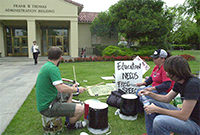Hungry and angry
Group declares 48-hour hunger strike and camps outside university president's
office at Thomas Administration Building
By MAURICE O NDOLE
The Campus Peace and Civil Liberties Coalition stepped up its fight against
the university by staging a 48-hour hunger strike to protest the use of
undercover agents at one of the group’s events last year.

Rupert Crump, a member of the Campus Peace and Civil Liberties
Coalition, beats a plastic drum outside the Thomas Administration
Building during the club’s 48-hour hunger strike protest.
Photo by Joseph Hollak |
Group members camped in front of Thomas Administration Building, the building
housing the office of university president John Welty.
Coalition president Ruth Obel-Jorgensen said that during the hunger strike,
striking members would drink only liquids. The aim of the hunger strike
is to pressure the university to respond to three their demands:
•Develop a policy against surveillance of student organization and
activities by undercover agents.
•Receive a public apology from the university for infiltrating the
meeting.
•Respond to the American Civil Liberties Union’s request,
which required the university to turn in every surveillance record it
has on the organization.
The group started its protest Wednesday at 1 p.m. after a press conference.
Several members of the group and their supporters brought baggage, ready
to camp outside the building. After setting up camp on the grassy area
in front of the building, they beat drums and staked protest placards
to the ground in various places around the area.
The placards included signs, that said, “Students are not terrorists,”
“Young Educated and Angry,” “Hungry 4 Democracy”
and “Starving for Civil Liberties.”
On Wednesday at around 7 p.m., about five strikers pitched tents in preparation
for the night. Later, at around 8:30 p.m., the strikers, who had drank
only water for the day, seemed to be in a merry mood as they played plastic
drums and received support from passersby.
The hunger strikers’ camp was quiet at around 1 a.m. on Thursday
with the members asleep inside three tents.
Obel-Jorgenson said the protest aimed at sending a strong message to the
university that undercover surveillance activities on student groups would
not be tolerated.
Thursday afternoon at around 1 p.m. the group members sat outside their
tents and played drums to mark the end of the first 24 hours of the strike.
In a light moment, Khara Matcham, a member of the group, demonstrated
a trick of balancing and rolling several sticks on each other, a trick
she claimed she learned during the hunger strike.
The group’s resolve to keep up with the hunger strike didn’t
seem to waver even after rain came down Thursday morning.
Protest participant Nicholas DeGraf said the rain didn’t dampen
the group’s spirits.
“The night was good,” DeGraf said. “It rained on us
all night, but everybody was happy.”
Obel-Jorgensen said her spirits were high despite the rain Thursday morning.
“I woke up at 4 a.m. because it was raining,” Obel-Jorgensen
said. “And all I’m remembering thinking was ‘oh my God,
stop raining, stop raining.’ ”
DeGraf said the response toward the group has been positive and people
have shown support.
But the university seems not to be moved by the protests. In a statement
released yesterday by university spokesman Mark Aydelotte, the university
maintained it has never sent undercover police agents to the group’s
meetings.
The statement described the situation as a misunderstanding of the Nov.
10 event, at which undercover agents allegedly infiltrated a lecture by
Gary Yourofsky, a vegan activist.
The university statement, however, admitted the school sent three plain-clothes
officers to the event to ensure the safety of the participants.
ACLU lawyer Mark Schlorsberg said that on Wednesday, they requested the
university to release its records about surveillance of the student group
through the Freedom of Information Act.
“We are asking the university and the Sheriff’s department
should come clean (and) reveal all the information they know about what
happened and take steps to ensure that students’ rights are protected,”
Schlorsberg said.
Schlorsberg said the ACLU also provided the university with a model of
a surveillance policy sample that they could consider adopting.
|
